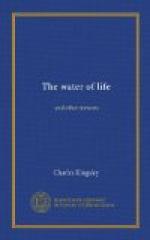Horrible, I say, and increasingly horrible, not merely to the sentimentalist, but to the man of sound reason and of sound conscience, must the scientific aspect of nature become, if a mere abstraction called law is to be the sole ruler of the universe; if— to quote the famous words of the German sage—’If, instead of the Divine Eye, there must glare on us an empty, black, bottomless eye-socket;’ and the stars and galaxies of heaven, in spite of all their present seeming regularity, are but an ’everlasting storm which no man guides.’
It was but a few days ago that we, and this little planet on which we live, caught a strange and startling glimpse of that everlasting storm which—shall I say it?—no one guides.
We were swept helpless, astronomers tell us, through a cloud of fiery stones, to which all the cunning bolts which man invents to slay his fellow-man, are but slow and weak engines of destruction.
We were free from the superstitious terror with which that meteor-shower would have been regarded in old times. We could comfort ourselves, too, with the fact that heaven’s artillery was not known as yet to have killed any one; and with the scientific explanation of that fact, namely, that most of the bolts were small enough to be melted and dissipated by their rush through our atmosphere.
But did the thought occur to none of us, how morally ghastly, in spite of all its physical beauty, was that grand sight, unless we were sure that behind it all, there was a living God? Unless we believed that not one of those bolts fell, or did not fall to the ground without our Father? That He had appointed the path, and the time, and the destiny, and the use of every atom of that matter, of which science could only tell us that it was rushing without a purpose, for ever through the homeless void?




